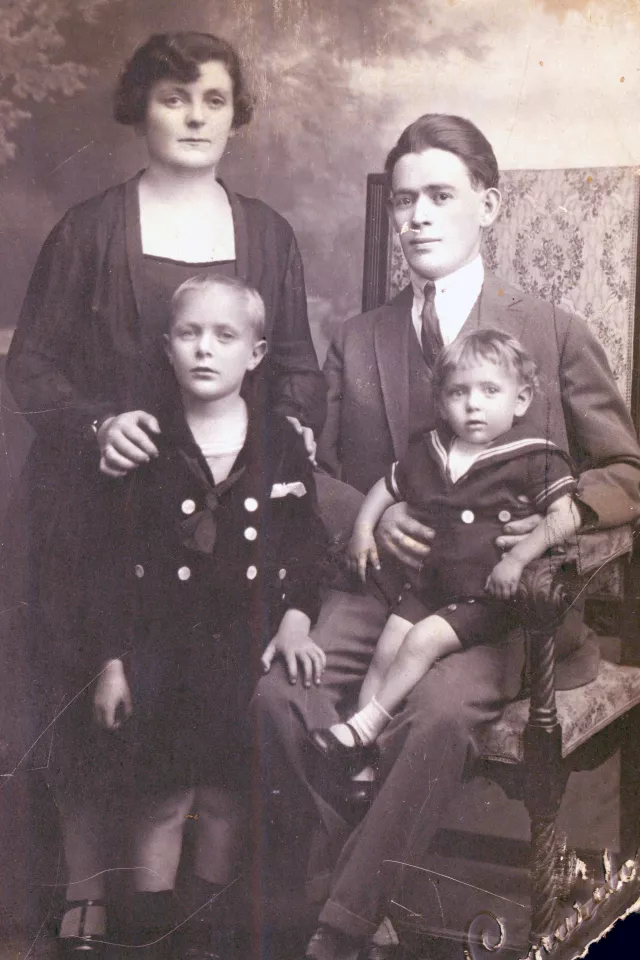This is the Leinweber family in 1927. My mother, Surica Marcus Leinweber (nee Froim), my father, Friedrich Leinweber, myself, Arnold Leinweber and my middle brother, Moritz Leinweber. The photo was taken in Bucharest at the Leonardo photo cabinet on Vacaresti Ave.
My mother came to Bucharest with her sister, Liza. She learnt to make brushes and paintbrushes, and she exercised this trade. She owned a workshop built by my biological father, but she couldn't keep it, so she sold it with workers included and ended up working herself in her former workshop. My biological father, Carol Marcus, died in April 1921, when I was 8 months old, and my mother remarried in 1924.
The one who adopted me and whose name I bear was a worthy man, Friedrich Leinweber. His behavior was beyond reproach and I never felt he was my stepfather. I remember my mother introducing him to me: 'Look, daddy's here, daddy's here!' I was two years and a half. He never did raise his voice at me, curse me, pull my ears or slap me. On the contrary, whenever I beat up my brothers - his children -, he left the house and looked for something to do elsewhere, lest he should lose control and say something bad or hit me. So I can say he loved me.
I was born in Bucharest on 12th August 1920. After my mother remarried, I didn't have any relationships with my biological father's family for a long time. Here's how I got to know his family. In the first day of school I went to the Malbim School [Ed. note: This school founded in 1898, next to the Malbim Synagogue, was named Talmud Torah Malbim and consisted of four elementary grades. It was located in the Dudesti quarter, a poor area inhabited predominantly by Jews.], where our social assistance center is based today. Headmaster Koritzer came outside and told the first-graders to line up holding hands two by two and to enter the classroom. I held the hand of a fair-haired boy with glasses and his mother said: 'Adolf, have you any idea who you're walking next to? Your cousin!' I turned to her and said: 'This is not my cousin. I only have two cousins, from Aunt Lisa [Lisa Gherman, sister of Mr. Leinweber's mother]. 'He is your cousin', she insisted. 'Your father and his father were brothers! Your father shot himself!' Well now, remember your own first day of school and the excitement of that moment. Can you imagine how it's like for a seven-year-old to learn such things on his first day of school?! This happened in 1927. My first day of school was the day I found out that I was an orphan and the man I was living with was not my actual father. I don't remember how that day went, but I know that, when I got home, I couldn't eat. And I bore inside me this psychological burden throughout my entire childhood and adolescence.
Moritz Leinweber, my middle brother, was born in 1926, in Bucharest. He went to high school too. When the time came for him to earn his living, I sent him to a former schoolmate of mine from the vocational school, who was a skillful man, to learn about wiring, and he managed to acquire some experience. This was before the war [World War II]. In two years he became very skillful. But the war came and there weren't any new buildings, so he learnt to paint houses. And he started painting and whitewashing. He went to Transnistria, but his lot wasn't thrown in a concentration camp. They remained under the jurisdiction of the Romanian Army. They were deported in 1942, which means that they spent almost 2 years there. My mother managed to send him some clothing through the liaison man at the drafting center. That character had his share of the deal, but he was a decent man, and, thanks to him, we were able to keep in touch with Moritz. The members of the lot were repatriated in an organized manner. Many of them scattered around the city of Iasi because they were afraid the Russians would seize them and send them to the front. They got to Bucharest after 23rd August [1944], with a great delay, because they had taken detours and had traveled at night in order to avoid the Russians, who were approaching the capital too. Afterwards, he became, like many others, a Party activist in the field of personnel, and he ended up a head of the financial department of the 6th district of Bucharest. He was awarded the Medal of Work. Moritz died of colon cancer in 1992. He had two children: Liviu and Marius. They are both in Israel now.
The Leinweber family
Share
Photos from this interviewee
The Centropa Collection at USHMM
The Centropa archive has been acquired by the United States Holocaust Memorial Museum in Washington, DC.
USHMM will soon offer a Special Collections page for Centropa.
Academics please note: USHMM can provide you with original language word-for-word transcripts and high resolution photographs. All publications should be credited: "From the Centropa Collection at the United States Memorial Museum in Washington, DC". Please contact collection [at] centropa.org.





























